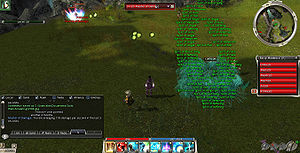User talk:Falconeye/Spirit Lord
Contemporary[edit]
Spirit spam (also known as Spirit Summon) is a term used to describe a style of play that involves extremely heavy or exclusive use of Binding Rituals and/or Nature Rituals. These rituals create spirits that either aid allies or hinder enemies; a versatile strategy that can be used in many different places as a very powerful solo build as well as a strong part of a party.
For this style of play, recharge time reducing skills and activation time reducing skills are valuable for PvP (e.g., Soul Twisting, Ritual Lord and Serpent's Quickness).
Primary Ritualist called Spirit Lords frequently exploits these with builds designed to place three (or more) spirits as the core foundation of their builds; an over-reliance fact that can be exploited by enemies intelligent enough to counter spirits. They create spirits and keep them alive for extensive lengths, or frequently resummon and quickly dispose of them, depending on their team roles. (The name is a portmanteau of Spirits and Ritual Lord.)
Ritualists use these spirits to tactically secure essential areas and quickly place many spirits within range of some critically strategic capture or choke point. This allows the team to focus on offensive measures, while the spirits harass or slow attackers using spirits like Pain, Shadowsong, or Wanderlust, which are a sort of defensive barrier at the same time.
Ritualists using Signet of Spirits are currently the most common Spirit Lords. When deciding to take several Spirit Lords in the same team, its is best to avoid having two spirits of the same name within range to each other, and the team should consider changing their builds accordingly.
Spiritway (commonly referred to as Sway) is a Spirit Lord gimmick build frequently seen in Heroes' Ascent.
Many other professions are also able to Spirit Spam quite well; Rangers can summon at low energy cost because of Expertise, Elementalists can summon high energy requiring spirits because of Energy Storage, and Necromancers are rarely concerned due to Soul Reaping's effect. However, primary Ritualists have access to Spawning Power skills and can also add runes to make their spirits much more effective both as indirect damage-reduction and direct-damage dealers.
Historical[edit]
- Nature rituals did not always summon spirits. At the original release of Prophecies, a nature ritual approximated an environment effect that was cast by a player and lasted for the ritual's duration.
- Only one nature ritual could be in effect at a time, with the most recently cast ritual replacing any earlier one. Furthermore, as there was no physical spirit to kill, nature rituals could not be ended prematurely except by casting another.
- When nature rituals were changed to create physical spirits, there was initially no limit on the number of copies of a spirit that could be on the field.
- At that time spirits also affected the physical forms of each other, and not just players.
- A team build known as "spirit spam" based on these facts dominated Heroes' Ascent (at the time known as Tomb of the Primeval Kings), utilizing large numbers of spirits created by rangers using Oath Shot to both body block other teams and prevent them from being able to score kills, thus allowing them to hold the Hall of Heroes for lengthy amounts of time.
- These Rangers, whom were originally called Spirit Spammers when describing the abusive application of Nature Rituals, gave rise to the build-based tactical term Spirit Spam.
- Note: Some believe this term to be somewhat outdated/misleading, as the current metagame places emphasise on few strategically located spirits, and not skill spamming multiple buttons every few seconds.
- Since the August 2005 update, due to some really abusive PvP spirit spam builds, all Spirits and the effects of Spirits no longer work on other Spirits; also, when a Spirit is cast, it kills all other allied Spirits of the same type within its range. (Example: Fertile Season no longer adds Health and armor to other Spirits). Before this update, many professions (particulary Rangers) were stacking nature rituals to the point that duplicates were barricading tactical choke-points and arrows were one-shotting player characters.
- Since the June 2007 update, the primary attribute Soul Reaping had this function:"For each point of Soul Reaping, you gain 1 Energy whenever a creature dies within Soul Reaping's range. You may only gain Energy in this way 3 times every 15 seconds. Spirits only provide you with Energy if they are under your control; you gain no Energy when other Spirits die."
- Before that update, the primary attribute Soul Reaping had this function: "For each point of Soul Reaping, you gain 1 Energy whenever a creature near you dies. You gain half that amount for Spirits. You may only gain energy this way once every 5 seconds."
- Note: All previous updates before the curent Soul Reaping-incarnation allowed a single ritualist to infuse a team of necromancers and act as their battery.
- Before that update, the primary attribute Soul Reaping had this function: "For each point of Soul Reaping, you gain 1 Energy whenever a creature near you dies. You gain half that amount for Spirits. You may only gain energy this way once every 5 seconds."
- Since the June 2009 update and the February 2010 update many binding rituals and spirit-related skills, in PvE, received buffs allowing for faster spirit creation, increased parameter strength and shorter recharge times across the ritualist attributes.
- During the February 2011 update, a glitch occurred with the "By Ural's Hammer!" functionality change that allowed it to resurrect all other allies, including minions, spirits, summoned creatures, etc. (However, damage from spirits is reduced significantly.) For this brief moment in PvE, the Hammertimeway allowed the long extinct Spirit Spammers to return with vengeance.
